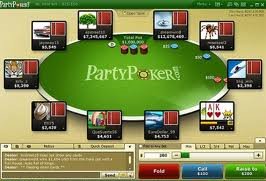MGM, Boyd, PartyPoker, WPT: "Four Brands on One Network"

 According to Yahoo Finance and eGamingReview, MGM Resorts International and Boyd Gaming, both gargantuan U.S.-based casino corporations, have partnered with bwin.party Digital Entertainment to launch a U.S.-facing internet gambling site. However, the spoils of the deal won’t come to life until there’s legalized and regulated internet gaming in the United States on the state or Federal level.
According to Yahoo Finance and eGamingReview, MGM Resorts International and Boyd Gaming, both gargantuan U.S.-based casino corporations, have partnered with bwin.party Digital Entertainment to launch a U.S.-facing internet gambling site. However, the spoils of the deal won’t come to life until there’s legalized and regulated internet gaming in the United States on the state or Federal level.
bwin.party co-CEO Jim Ryan told EGRon Tuesday, “There will be one poker network, with MGM, Boyd, PartyPoker, and the WPT, four brands on one network.” Remember, PartyPoker is the parent company of the WPT. And if you’re not familiar with Boyd Gaming, it owns and operates the Coast Casino family in Las Vegas and the poker-friendly Borgata in Atlantic City, among other establishments.
According to Yahoo, if and when internet gambling is legalized and regulated in the United States, “PartyPoker and other brands” would represent the new conglomerate. Currently, bwin and PartyPoker remain separate entities, but are in the process of being integrated. Both are members of the PocketFives Partnersprogram and you can snag one free month of PocketFives Training with the sign-up fee waived for signing up for either.
EGR added that the group was already investigating the possibility of obtaining a license in Nevada: “The bwin.party co-CEO added that the company had… the agreements… the Nevada-licensed entities filed for approval with state regulators. The Nevada legislature has mandated that final regulations for intrastate poker be adopted by January 2012, to take effect once online poker is authorized at Federal level.”
 Ryan told Yahoo, “We have been putting in place the foundation, if you will, to reenter the market.” PartyPoker jettisoned the U.S. market in 2006 when the Unlawful Internet Gambling Enforcement Act (UIGEA) was enacted. The bill outlawed transactions between banks and “unlawful internet gambling” sites, but failed to specify what that three-word phrase meant. When PartyPoker left, it was the largest site in the world and fresh off advertising its Monster promotion.
Ryan told Yahoo, “We have been putting in place the foundation, if you will, to reenter the market.” PartyPoker jettisoned the U.S. market in 2006 when the Unlawful Internet Gambling Enforcement Act (UIGEA) was enacted. The bill outlawed transactions between banks and “unlawful internet gambling” sites, but failed to specify what that three-word phrase meant. When PartyPoker left, it was the largest site in the world and fresh off advertising its Monster promotion.
Part of the reason PartyPoker may have vacated the market five years ago was in deference to the company’s shareholders. Ryan told Yahoo, “Did we sit back and watch in envy, knowing full well that we [had]had 50 percent of the market at that point? Perhaps, but we never questioned our decision.” Now, bwin.party is traded on the London Stock Exchange under the symbol “BPTY” and could reenter the American market once online poker is legalized at the state or Federal level.
According to the Wall Street Journal, Boyd received a 10% stake in the joint venture should it ever see the light of day. In addition, Boyd received a 15-year license to use bwin.party’s software to offer online poker to U.S. players under a separate brand.
Boyd Gaming Chief Executive Keith Smith told the Journal, “We see online poker as a compelling future growth opportunity for our company, and this agreement would position Boyd Gaming to quickly become a leader in the online poker market in the United States.”
Ryan was looking forward to the venture materializing should an individual state or the U.S. Government elect to green-light internet poker. He commented to EGR, “The nature of these deals is that they cover both Federal and state outcomes. We effectively cover all possibilities with this transaction.”
 Last Tuesday, the U.S. House Subcommittee on Commerce, Manufacturing, and Tradeheld a hearing to discuss the viability of allowing online gaming in the United States. PocketFives has learned that no follow-up hearing has been scheduled. To that end, Poker Players Alliance Executive Director John Pappas told PocketFives on Monday that “nothing official” has been announced. Read more.
Last Tuesday, the U.S. House Subcommittee on Commerce, Manufacturing, and Tradeheld a hearing to discuss the viability of allowing online gaming in the United States. PocketFives has learned that no follow-up hearing has been scheduled. To that end, Poker Players Alliance Executive Director John Pappas told PocketFives on Monday that “nothing official” has been announced. Read more.
On the Federal level, Congressman Joe Barton (R-TX) has introduced HR 2366, the Internet Gambling Prohibition, Poker Consumer Protection, and Strengthening UIGEA Act. The measure would legalize and regulate online poker in the U.S. through a series of state agencies and was introduced in June. It’s up to 25 co-sponsors on both sides of the aisle, but has yet to be marked up or specifically debated in committee.
Stay tuned to PocketFives for the latest poker legislation news.




